

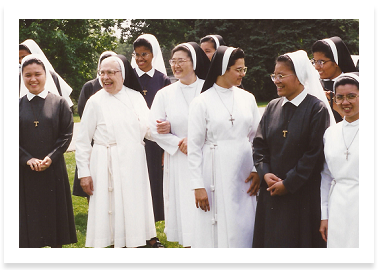 Community prayer and devotion are the center of our Franciscan life. Daily our Sisters gather throughout the world for the celebration of Holy Eucharist and choral recitation of the Liturgy of the Hours (Divine Office: morning, midday, evening and night time). Daily the Sisters recite the Franciscan Crown Rosary, Litany of the Blessed Virgin, and weekly we follow the Way of the Cross. Sisters also partake in private devotional prayers throughout the day to build their personal relationship with Jesus Christ. Evening Holy Hour ends our busy day.
Community prayer and devotion are the center of our Franciscan life. Daily our Sisters gather throughout the world for the celebration of Holy Eucharist and choral recitation of the Liturgy of the Hours (Divine Office: morning, midday, evening and night time). Daily the Sisters recite the Franciscan Crown Rosary, Litany of the Blessed Virgin, and weekly we follow the Way of the Cross. Sisters also partake in private devotional prayers throughout the day to build their personal relationship with Jesus Christ. Evening Holy Hour ends our busy day.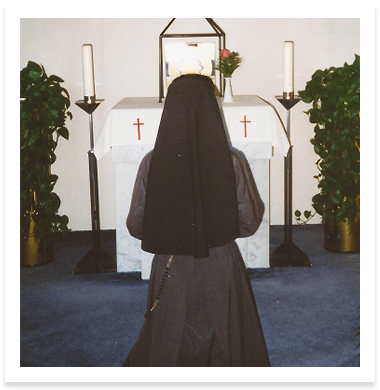 Daily Schedule
Daily Schedule
We adhere to a rigid schedule so we remain focused on the tasks God has for us.
5:30 ~ Rise
6:00 ~ Morning Prayers followed by Holy Mass
7:00 ~ Breakfast
7:45 ~ Apostolate Work, Classes, Housework
12:00 ~ Midday Prayer followed by Dinner
1:15 ~ Apostolate Work, Classes, Housework, Personal Prayer
5:15 ~ Spiritual Reading
5:45 ~ Holy Hour with Evening Prayer, Adoration of the Blessed Sacrament, Meditation
7:00 ~ Supper
8:00 ~ Night Prayer, Recreation, Study Time
9:00 ~ Great Silence begins, Retire
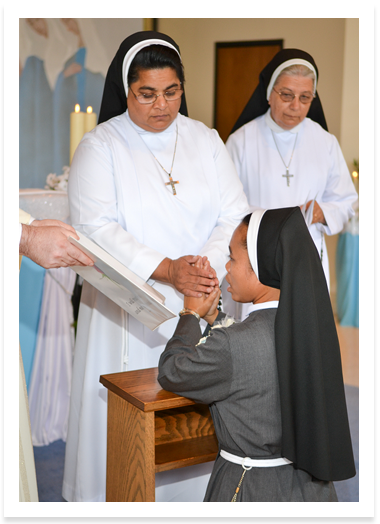 Saint John Paul II, in his Exhortation, Vita Consecrata, Stated:
Saint John Paul II, in his Exhortation, Vita Consecrata, Stated:
“...consecrated life, through the prompting of the Holy Spirit, ‘constitutes a closer imitation and an abiding re-enactment in the Church of the way of life which Jesus the supreme Consecrated One and missionary of the Father embraced and proposed to his disciples” (VC, 22).
The evangelical counsels are a gift of the Trinity by which certain followers of the Lord are consecrated to live the Gospel in concentrated form. The evangelical counsels—chastity, poverty, obedience—express the intra-Trinitarian love which Jesus revealed in his sacred humanity, in his preaching, and in his death and resurrection. The evangelical counsels when lived in the power of the Holy Spirit, bring about in individual religious and in the religious communities ‘a transfigured way of life capable of amazing the world’ (VC, 20). The three vows are also called the evangelical counsels. They describe a radical way to live out Gospel values. Poverty, chastity, and obedience are professed as vows by each Sister of the Franciscan Sisters of Saint Elizabeth.
Poverty
The Religious Sister freely chooses to share all in common with her fellow Religious Sisters rather than have personal ownership of any material goods. In this sense, she proclaims that God is her one and only treasure. Living a radical life of poverty allows her to be open not just to the materially poor but to the spiritually poor and helps her to lead them to God in imitation of Jesus. She becomes a total gift to God.
Chastity
The Religious Sister freely chooses a celibate way of loving. Chastity allows the Religious Sister to fully express her love, as a way to serve others, not just an exclusive person, but all. She radiates with a spirit of joy, witnessing to others how special her relationship is with God.
Obedience
The Religious Sister freely chooses obedience to signify her choice for common good over personal desires. Obedience is the practice of the imitation of Christ. Obedience shows the liberating beauty of dependence, showing a deep sense of responsibility, commitment and trust in other persons and in God. The Will of God for the Religious Sister is revealed through her Superiors who always seek the best for the Sister and the Community. Obedience allows the Religious Sister to put her life at the service of the Church.
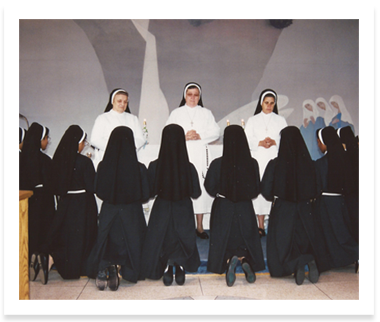 Our Religious Habit
Our Religious Habit
The joy, warmth and peace of Saint Francis of Assisi radiates in the life of every Franciscan Sister of Saint Elizabeth, and our Franciscan religious habit is an outward sign of our religious consecration. We joyfully wear our Franciscan habits as witness to the world that we are brides of Christ, called to live the Gospel message more profoundly through our religious profession of the vows of poverty, chastity, and obedience. Our religious habit is a visible sign of our leaving the world and consecrating our lives to the Lord and also a symbol of belonging to our community that serves the needs of the Church. The gray habits daily remind us that we are dust and to dust we shall return.  Our Franciscan Cord
Our Franciscan Cord
When Saint Francis initially embraced the life of poverty he clothed himself in the coarse robe of the poor and tied his waist with a rope cord known as the belt of the poor. St. Francis used the cord in imitation of following poor, humble, and obedient Christ. The cord is traditionally tied with three knots which symbolize the Evangelical Counsels or the three vows: Chastity, Poverty, and Obedience which we profess at our First Profession of Vows and jubilantly renew each year. Our Franciscan Crown Rosary
Our Franciscan Crown Rosary
The Franciscan Crown Rosary worn hanging from the Franciscan cord is made up of seven decades of beads, each decade representing a different joy in the life of our Blessed Mother Mary. The seven joys are: the Annunciation, the Visitation, the Nativity, the Adoration of the Magi, the Finding of Jesus in the Temple, the Resurrection, and the Assumption.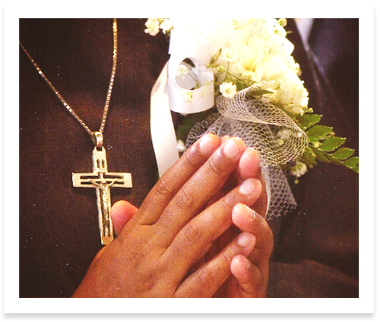 Our Crucifix
Our Crucifix
The specially designed crucifix we wear around our neck is a symbol of God’s love for us. It reminds us that our only glory is the cross on which our Lord died for us. The Crucifix is enwrapped in an outer border. The border represents our Community of Religious Sisters, spanning the world yet we are all united to Christ through His sacrificial love for each of us. Our Crucifix Ring
Our Crucifix Ring
Perpetually professed Sisters receive a crucifix ring as a symbol of their being espoused to Christ. The ring is a sign and symbol to both the Sisters and the world of their love for Jesus and His love for them—a symbol of total commitment to God’s infinite love and a living witness to the Church.
We take these words of Saint Ludovico and put them into practice as we serve throughout the world and within the United States. Our Elderly Sisters and Infirm Sisters serve the Church through their prayers.
|
|
 | St. Francis is the living image of Jesus Christ. It is necessary to imitate him in virtue, in poverty of spirit, in separating from the world and in the love for Jesus Christ. |  |
~Saint Ludovico of Casoria |